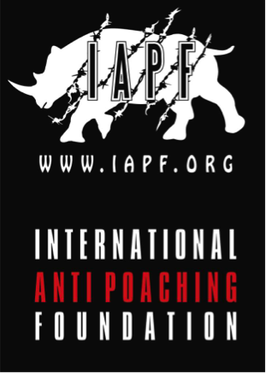This Author Fights Rhino Poaching
The Truth...
 "Since the start of the poaching epidemic in 2008 South Africa has lost over 4000 rhinos - a figure that, despite so much effort, increases daily. Coupled with the increasing poaching figure comes the question – why after all this are we still losing more rhino than ever? Sadly, few people realize the challenges facing those on the frontlines – thousands of kilometers to patrol with little to no idea of where the poachers plan to hit next. At this stage the poachers have the upper hand – they know when, they know how, and if need be they’ll just come back another day or hit a softer target. The organised crime syndicates that run poaching gangs are ruthless, often involved in other syndicated crime like vehicle theft and cash-in-transit heists. Rhino horn is just another commodity to them, but with less risk. They have established networks, including insiders within the authorities, and strive to make connections with reserve staff to disclose information on rhino and ranger locations. Corruption, at the end of the day, is our greatest enemy." Read more...
"Since the start of the poaching epidemic in 2008 South Africa has lost over 4000 rhinos - a figure that, despite so much effort, increases daily. Coupled with the increasing poaching figure comes the question – why after all this are we still losing more rhino than ever? Sadly, few people realize the challenges facing those on the frontlines – thousands of kilometers to patrol with little to no idea of where the poachers plan to hit next. At this stage the poachers have the upper hand – they know when, they know how, and if need be they’ll just come back another day or hit a softer target. The organised crime syndicates that run poaching gangs are ruthless, often involved in other syndicated crime like vehicle theft and cash-in-transit heists. Rhino horn is just another commodity to them, but with less risk. They have established networks, including insiders within the authorities, and strive to make connections with reserve staff to disclose information on rhino and ranger locations. Corruption, at the end of the day, is our greatest enemy." Read more...
 The IAPF has a structured approach to conservation, employing the relevant tactics and technology to defend wildlife from the ever increasing threat of poaching within protected areas. Anti-poaching however is only a portion of the conservation solution. To be a part of successful projects, the IAPF works alongside partners who specialise in community engagement and development, research and development, wildlife rescue and biodiversity management.
The IAPF has a structured approach to conservation, employing the relevant tactics and technology to defend wildlife from the ever increasing threat of poaching within protected areas. Anti-poaching however is only a portion of the conservation solution. To be a part of successful projects, the IAPF works alongside partners who specialise in community engagement and development, research and development, wildlife rescue and biodiversity management.

IRF is financially supported by around 900 individual “members”, along with zoos, private foundations, corporations and government agencies. The International Rhino Foundation is governed by a Board of Directors who generously contribute time and financial resources to its efforts. IRF maintains a very small staff. IRF’s lean structure allows more than 85% of its funds to go directly to its field programs in Africa and Asia. The IRF Office is based in Fort Worth, Texas (USA).
IRF’s current major programs include: 1) Indonesia Rhino Protection Units, anti-poaching patrol units which protect Sumatran and Javan rhinos in the wild; 2) the Sumatran Rhino Sanctuary, a research and breeding center for Sumatran rhinos in Way Kambas National Park; 3) the Javan Rhino Study and Conservation Area, a program to expand the only viable habitat for Javan rhinos in the world by 4,000 hectares; 4) Indian Rhino Vision 2020, a program aimed at increasing the number of Indian rhinos and spreading the population out over more protected areas; 5) Zimbabwe Lowveld Rhino Conservation Program, which provides management, monitoring and veterinary interventions for black rhinos in Zimbabwe; and 6) Operation Stop Poaching Now, a campaign to provide training and equipment to anti-poaching units in Zimbabwe and South Africa. IRF also supports scientific research, regularly providing grants for work that is directly applicable to management, propagation and conservation of rhinoceros species in nature and in captivity.
 Fight For Rhinos mission is to save rhinos from extinction by creating awareness and providing support for rhino conservation projects.
Fight For Rhinos mission is to save rhinos from extinction by creating awareness and providing support for rhino conservation projects.
We are an officially registered 501 non-profit in the United States.
We are partnered with the UK-based non-profit, Helping Rhinos; and part of the global Rhino Alliance. Together we support various projects and campaigns that we feel are the BEST combined efforts to secure a future for rhinos.
We greatly appreciate any and all support for our projects, and 100% of donations go directly to the rhinos in our field projects.
Our motto is “Endelea Kupigana”, Swahili for Keep Fighting! Through perseverance and work, we CAN make a difference!
 "Since the start of the poaching epidemic in 2008 South Africa has lost over 4000 rhinos - a figure that, despite so much effort, increases daily. Coupled with the increasing poaching figure comes the question – why after all this are we still losing more rhino than ever? Sadly, few people realize the challenges facing those on the frontlines – thousands of kilometers to patrol with little to no idea of where the poachers plan to hit next. At this stage the poachers have the upper hand – they know when, they know how, and if need be they’ll just come back another day or hit a softer target. The organised crime syndicates that run poaching gangs are ruthless, often involved in other syndicated crime like vehicle theft and cash-in-transit heists. Rhino horn is just another commodity to them, but with less risk. They have established networks, including insiders within the authorities, and strive to make connections with reserve staff to disclose information on rhino and ranger locations. Corruption, at the end of the day, is our greatest enemy." Read more...
"Since the start of the poaching epidemic in 2008 South Africa has lost over 4000 rhinos - a figure that, despite so much effort, increases daily. Coupled with the increasing poaching figure comes the question – why after all this are we still losing more rhino than ever? Sadly, few people realize the challenges facing those on the frontlines – thousands of kilometers to patrol with little to no idea of where the poachers plan to hit next. At this stage the poachers have the upper hand – they know when, they know how, and if need be they’ll just come back another day or hit a softer target. The organised crime syndicates that run poaching gangs are ruthless, often involved in other syndicated crime like vehicle theft and cash-in-transit heists. Rhino horn is just another commodity to them, but with less risk. They have established networks, including insiders within the authorities, and strive to make connections with reserve staff to disclose information on rhino and ranger locations. Corruption, at the end of the day, is our greatest enemy." Read more... The IAPF has a structured approach to conservation, employing the relevant tactics and technology to defend wildlife from the ever increasing threat of poaching within protected areas. Anti-poaching however is only a portion of the conservation solution. To be a part of successful projects, the IAPF works alongside partners who specialise in community engagement and development, research and development, wildlife rescue and biodiversity management.
The IAPF has a structured approach to conservation, employing the relevant tactics and technology to defend wildlife from the ever increasing threat of poaching within protected areas. Anti-poaching however is only a portion of the conservation solution. To be a part of successful projects, the IAPF works alongside partners who specialise in community engagement and development, research and development, wildlife rescue and biodiversity management.
Anti-poaching protects community assets, creates jobs, promotes training and education and reduces habitat destruction. In the many water stressed countries of southern Africa, future generations will depend on these critical natural environments for their very wellbeing.

Following the successful donation and translocation of six rhino from &Beyond Phinda Private Game Reserve in north-eastern KwaZulu Natal in South Africa to Botswana’s Okavango Delta in 2013, &Beyond is going even further in its efforts to secure the future of these rare and unique animals. Through the Rhinos Without Borders initiative, &Beyond, in partnership with Great Plains Conservation, as well as various government ministries, has committed to moving up to 100 rhinos (both black and white) from existing high density populations in South Africa, and releasing them into the wild in various parts of Botswana, a country with traditionally low rhino densities and stringent anti-poaching measures.IRF is financially supported by around 900 individual “members”, along with zoos, private foundations, corporations and government agencies. The International Rhino Foundation is governed by a Board of Directors who generously contribute time and financial resources to its efforts. IRF maintains a very small staff. IRF’s lean structure allows more than 85% of its funds to go directly to its field programs in Africa and Asia. The IRF Office is based in Fort Worth, Texas (USA).
 Fight For Rhinos mission is to save rhinos from extinction by creating awareness and providing support for rhino conservation projects.
Fight For Rhinos mission is to save rhinos from extinction by creating awareness and providing support for rhino conservation projects.We are an officially registered 501 non-profit in the United States.
We are partnered with the UK-based non-profit, Helping Rhinos; and part of the global Rhino Alliance. Together we support various projects and campaigns that we feel are the BEST combined efforts to secure a future for rhinos.
We greatly appreciate any and all support for our projects, and 100% of donations go directly to the rhinos in our field projects.
Our motto is “Endelea Kupigana”, Swahili for Keep Fighting! Through perseverance and work, we CAN make a difference!




Comments
Post a Comment